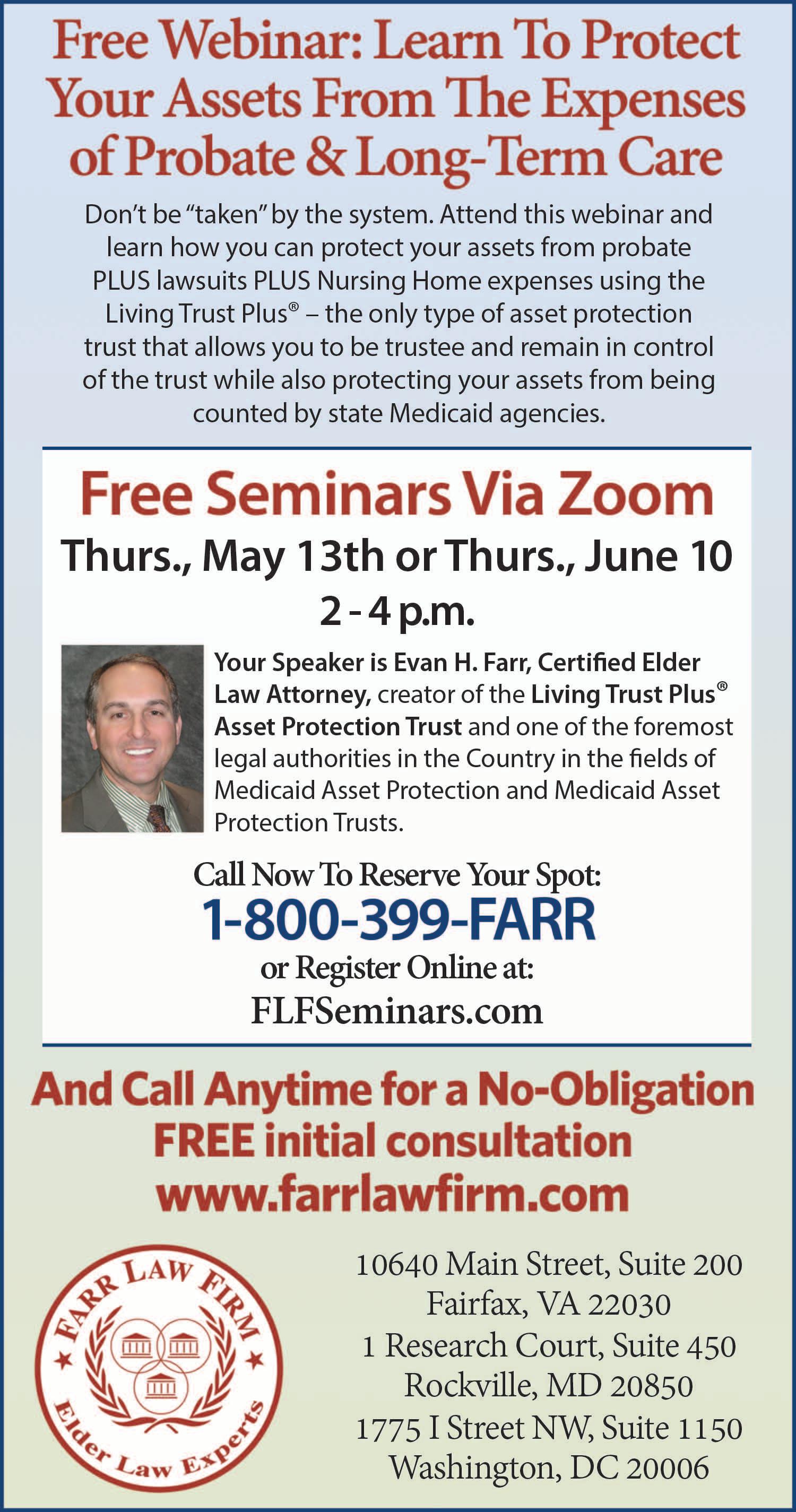
26 minute read
LAW & MONEY
Money Law &
© RMARMION|DREAMSTIME.COM
Insurance agents share five common misconceptions about insurance. See story on page 31.
Afraid to retire, even though you can?
By Kara Duckworth
I am seeing an interesting pattern in discussions with my clients about retirement — and it’s certainly not one I was expecting. Instead of worrying about whether they’ll have enough saved to enjoy retirement, they’re worrying about whether they’ll enjoy retirement at all.
Discussions about retirement start almost as soon as people get their first jobs. Whether it’s saving as much as possible in their 401(k) plan or making an annual IRA contribution, the focus is always on having enough money to retire and enjoy all the things they’ve been dreaming of doing.
For some, the big plans include traveling to far-flung destinations; for others, it’s spending time with family, finally moving to that place they love to visit on vacation, or volunteering.
As people make progress on achieving those retirement dreams, they don’t spend time thinking about what life may actually look like in retirement.
Just last week, I spoke to a client who says she would like to retire at the end of this year. We have been working toward her economic freedom for years, and she has enough assets to be able to make all the dreams she has expressed come to fruition.
We got to the end of the financial plan discussion, and I was all set to celebrate starting the countdown to the long-awaited retirement date.
But there was a pause, and then she said, “I don’t know if I can actually start to withdraw the money and feel good about it. I have been so focused on saving, investing and planning for years that I don’t know how I will feel about starting to take money out, even if it’s for things I think I want.”
Feelings of ambivalence
She went on to say that she always thought she wanted to move to another state to be close to her extended family, but she now realizes that they are going to be busy with their own lives, and it won’t just be fun all the time, like her visits now. She worries that the photography and golf hobbies that she feels like she never has time to enjoy now won’t be enough to fill her days. She has traveled extensively already, and the list of places she still wants to visit is getting shorter.
In other words, her biggest worry about retiring is what she is going to do with her time — even though she says frequently that she can’t wait to stop working.
For other people, retiring from being an expert in their field or having a prestigious job feels like giving up part of the identity they have worked very hard to earn.
So, what do you do when the hardest part about retirement is actually retiring? Here are some ideas to make retirement the next step in a journey, not a final destination:
Consider slowing down at work in-
stead of stopping completely. Working part-time allows you to have the best of both worlds: continued income and a dayto-day sense of purpose, as well as the time to pursue hobbies, travel and leisure.
Try before you buy. If relocation is in your retirement plans, take a new location for a test drive before committing to living there full-time.
Rent a house for a year in a new state to see if you like living there. In the meantime, you can rent out your current home for some income, or just come back home for a break during the very hot or cold months in the new state.
Plan to explore new things. While you may have a few hobbies that you enjoy now and want to pursue in retirement, you can also plan to try out new experiences to keep your day-to-day life fresh and interesting.
Many people find that volunteering gives them the purpose that working used to fulfill — but without the stress.
You can also explore activities that you always thought sounded fun — painting, ballroom dancing, pickleball — but never had time to do before.
“I am busier now that I’m retired than I was when I was working” is a common theme I hear from clients, but now the activities are things they enjoy.
Having your financial adviser work with you on planning for your life in retirement as well as your finances will ensure the transition you make will be happy and fulfilling. © 2021 The Kiplinger Washington Editors, Inc. Distributed by Tribune Content Agency, LLC.
IRS ignores those filing paper tax returns
I have been filing my federal tax returns told me that an IRS advocate was assigned to prepared my return and tried to file elec- es their records. on paper for more than 50 years. It was me, and that I could expect a response from tronically. Even though the IRS has assigned me a never any trouble at all. After her. I was provided her phone When you file electronically, the IRS tax advocate who supposedly should be asall, I had been an enrolled number. asks for your adjusted gross income (AGI) sisting me, she has not contacted me, and agent for several years. I then contacted TurboTax for the previous year as a security measure. she doesn’t return my phone calls.
But that all changed after I to file electronically. However, I entered the AGI from my 2019 return but, If millions of taxpayers like me are filed my 2019 return. representatives at TurboTax as I feared, the IRS rejected my e-filing be- forced to file a paper return for our 2020
I filed it in April 2020. The told me that after October, the cause it has no record of that return! taxes, how long will the delay be? The IRS IRS still has not processed it. IRS no longer accepted e-files After the rejection, TurboTax represen- has already extended the April 15 filing When I go to the IRS website for 2019, and that they could tatives then told me to enter zero for my date to May 17 because of its inability to and use the “Where’s my re- only file a paper return. They 2019 AGI. I did that, and again the IRS has process returns in a timely manner. fund?” option, the IRS doesn’t suggested that I file a paper re- rejected my e-filing. (H&R Block informed The IRS has no legitimate reason not to even indicate that my return has been received. After several months of not receiving an acknowledgment THE SAVINGS GAME By Elliot Raphaelson turn again by registered mail. I followed their advice and filed a copy of my previous paper return again. This was me that its software also requires a valid AGI from 2019.) TurboTax has now told me I must file by paper again in 2020 because the IRS won’t allow individuals whose 2019 returns have not been processed to file their 2020 returns electronically. I suggest you write to the IRS commissioner Charles Rettig, as I from the IRS that it has my re- against the IRS recommenda- accept my request to file electronically. Natu- have done, at 77 K St. NE, Washington, turn, I wrote to my congressional represen- tion. The IRS says on its website not to con- rally, I don’t want to file a paper return again. D.C. 20002, and demand that he inform his tative complaining about the delay. The rep- tact them and not to refile. However, the IRS I have gone to the internet to see if my situ- staff of this problem, and that they take resentative asked me for permission to con- still has not indicated that it has received any ation is common. I have found that others are whatever steps are necessary to accept etact the IRS on my behalf, and I consented. paper return from me for 2019. faced with the same problem. It’s a Catch-22. filed returns from taxpayers who have no
As a result of that intervention, I received a Millions of individuals have also filed apparent record of AGI for 2019. phone response from an IRS representative The trouble continues paper tax returns for 2019 that have not This situation is ridiculous. We are simin December, who told me to file my return I contacted TurboTax in March 2021 to been processed. Yet the IRS won’t allow eelectronically. The IRS representative also file my 2020 tax return electronically. They filing because there is no AGI that match-
INQUILINOS QUE ESTÁN ATRASADOS EN PAGO DEL ALQUILER:
ORGANIZACIONES DE APOYO
Condado de Montgomery: 311 (240-777-0311) CASA: 301-431-4185 Housing Initiative Partnership: 301-916-5946 Latino Economic Development Center: 202-540-7438 Renters Alliance: info@rentersalliance.org Maryland Legal Aid: 240-314-0373 Solicite asistencia para la renta: www.mc311.com/rentrelief Prepárese ahora para su día en la Corte. Para recibir asesoramiento, póngase en contacto con una Organización de Apoyo para inquilinos. Si usted es citado a la Corte: ¡Vaya la Corte! Hay ayuda disponible en la corte. www.MontgomeryCountyMD.gov/renters MONTGOMERY COUNTY P ep ma ien ento o,p pó ó g qui u nos s Pa RENTERS WHO ARE BEHIND ON RENT: www.MontgomeryCountyMD.gov/renters Apply for Rent Assistance: www.mc311.com/rentrelief Prepare now for your day in Court. Contact a renter Support Organization for guidance. If you are called to Court: Come to Court! Help is available at Court. SUPPORT ORGANIZATIONS: Montgomery County: 311 (240-777-0311) CASA: 301-431-4185 Housing Initiative Partnership: 301-916-5946 Latino Economic Development Center: 202-540-7438 MONTGOMERY COUNTY Renters Alliance: info@rentersalliance.org Maryland Legal Aid: 240-314-0373
Support for Renters and Landlords $59 Million for Rent Relief
Renters – If you are behind on rent, you have support and options: Montgomery County has rental assistance available: Visit www. mc311.com/rentrelief to learn more and apply. You also may contact a Support Organization for help in applying for rental assistance. Find a Support Organization at
www.montgomerycountymd. gov/renters
If you are concerned about possible eviction actions, contact a Support Organization to prepare: www.
montgomerycountymd. gov/renters
Legal assistance for renters is available at Court, but you must attend your Court date to exercise your protections under an eviction moratorium. Landlords – if your renter is behind on rent, landlords and renters can work together to apply for rental assistance. Back rent is being paid directly to landlords. More information is available at
www.montgomerycountymd. gov/landlords
Montgomery County offers information about rental properties
Montgomery County now has an easy way to view rental property information the County collects annually from apartment building managers. The public can visit www.
montgomerycountymd.gov/
RentalMarketplace to search and view information about location, property-level rent levels and unit sizes reported to the County by each property. Individuals looking for rental housing can search for options within a range of rents, geography and type (e.g., senior housing, income-restricted, number of bedrooms). After identifying properties of interest, individuals can contact each property to learn about current availability of units and rents. The County is pleased to offer this resource to help residents connect with rental housing opportunities.
Department of Housing and Community Affairs

By Elliott Raphaelson
Seeking Alpha (seekingalpha.com), a well-respected publisher of finance-related content, recently published an enlightening article titled “4 Simple Rules To Protect Your Portfolio From Yourself.” It’s a long article, full of sound advice based on historical analysis and advice from many stock market experts, such as Ray Dalio, Warren Buffett and Charlie Munger, among others.
I list the author’s rules below, with my own commentary.
Rule 1: “Invest a fixed amount in any given month.”
The reason for this rule is quite simple: You will never be able to time the market reliably. Even the most successful investors don’t pretend they can predict when the markets will hit their peaks or hit the bottom.
In the long run, stocks will appreciate in value along with the growth in the economy, and if you are out of the market long enough, you are guaranteed to lose the opportunity to increase the value of your portfolio.
As the author of the article points out, the best and worst days in the market happen close together. If you avoid the worst days, you will also miss the best ones.
One way to take advantage of the longterm trends in the market is to consistently invest. The author recommends this method: Determine at the beginning of each year how much you will invest and divide that amount by 12. That’s your monthly investment budget.
The value of this approach is discipline. It forces you to invest even when you are fearful of a market fall. It also prevents you from investing too much when you may be over-optimistic. Investing gradually forces you to take advantage of the growth in stock value over time.
Overall, by investing a fixed amount each month, you are, as the author says, both “forcing” and “easing” your way into investing, taking advantage of long-term trends, without having to guess right about market increases and decreases.
Rule 2: “Define your maximum allocation to a stock.”
One of the bedrock rules of investing is diversification: not exposing yourself to undue risk by owning a disproportionate amount of a given stock or industry group.
But how do you judge the proper allocation, especially if you are holding “winners” you are loathe to sell?
The author recommends this be done from a cost-basis perspective. For example, If you invested $25,000 in an individual stock, your cost basis remains $25,000 even if, say, the market value has increased to $100,000.
You may decide, as the author recommends, to cap your exposure at anywhere from 5% (the equivalent of holding at least 20 companies) to 10% (the equivalent of at least 10 companies) — again, on the basis of cost basis, not current market value. [Ed. Note: That is, don’t let what you invested in any one company’s stock represent more than 5% (or 10%) of your total expenditures on stock.]
If you focus on risk allocation from a cost basis rather than current value, it will encourage you to add to your winners and prevent you from adding too much to your losers.
Rule 3: “Don’t add to your losers.”
The best way to avoid having a significant loser in your portfolio is to never average down. It’s normal to have some losers in your portfolio. But you must avoid the urge to “double down.” It rarely succeeds.
Rule 4: “Don’t sell your winners.”
If Rule 3 is difficult for some, Rule 4 is easy to follow. It merely requires you to leave your winners alone — for as long as possible. The author quotes the legendary investor Charlie Munger: “The first rule of compounding: Never interrupt it unnecessarily.”
As Warren Buffett once remarked, “Our favorite holding period is forever.” His philosophy, which is hard to argue with, is that fear and greed lead investors to sell and buy at the wrong time.
If you find a good company, unless it suffers a drastic change that threatens its ability to compound earnings, you should hold it as long as possible.
Although the article focused on individual stocks, I believe the recommendations are applicable to specific sectors also.
Elliot Raphaelson welcomes your questions and comments at raphelliot@gmail.com. © 2021 Elliot Raphaelson. Distributed by Tribune Content Agency, LLC.
Paper returns
From page 28 ply trying to comply with the law and file our taxes, and we should not be punished because the IRS hasn’t processed 2019 paper returns yet.
I suggest you copy Treasury Secretary Janet Yellen with your correspondence to the IRS commissioner. You can reach her at the Treasury Department, 1500 Pennsylvania Ave. NW, Washington, DC 20220.
Elliot Raphaelson welcomes your questions and comments at raphelliot@gmail.com. © 2021 Elliot Raphaelson. Distributed by Tribune Content Agency, LLC.
Retool, Recharge, and Reinvent Yourself at JCA’S VIRTUAL 50+ EMPLOYMENT EXPOS
This FREE service of the Jewish Council for the Aging is made possible by a grant from Montgomery County.
If you are over 50 and looking for work, you won’t want to miss these events! You can • Network with multiple area employers – offering full-time, part-time and consulting job opportunities • Attend free workshops • Learn new job-search skills

The expos will take place via Zoom on
Wednesday, May 19 from 10 a.m. to 2 p.m. Tuesday, June 15 from 10 a.m. to 2 p.m. Register using this link: https://virtualexpos.accessjca.org/

JCA® — the Jewish Council for the Aging of Greater Washington – proudly serves people of all faiths and from all walks of life.
By Sarah Schlichter
Insurance is notoriously complicated, and few people have the time or desire to pore over their policies. But some basic knowledge can go a long way. And that’s where an insurance agent can help, by clearing up some of the most common misconceptions they encounter.
Here are five things agents say are helpful for customers to know:
Insurance doesn’t cover everything
When it comes to insurance, “Most people don’t understand the details,” said Andrew McGill, agent at The Insurance Shoppe in Tennessee. For instance, they often don’t realize that most homeowners policies won’t cover flood or earthquake damage. If your home is at risk for these disasters, you need separate coverage.
Auto policies generally cover only personal use of your car, so if you’ve picked up a side gig delivering groceries or meals during the pandemic, you likely need additional coverage, said Keya Pratt, agent and CEO of Pratt Insurance LLC in Richmond, Virginia. Otherwise, accidents you have on the job may not be covered.
Insurance policies of all types also generally exclude wear and tear, said Katherine Navarro Wong, a State Farm agent in Santa Rosa, California. She often gets calls from policyholders asking if their insurance will pay for things like broken dishwashers or aging gutters.
The answer is no. Insurance is designed to cover sudden, accidental damage, not regular maintenance. “We’re not going to replace [an] old pipe,” Wong said, “but if the pipe accidentally burst and ruined the wall and the flooring,” that would be covered.
A gap in coverage can be costly
There are various reasons you might let your car insurance policy lapse. Perhaps you’re having trouble paying your bills, or you no longer own a vehicle.
But this could cost you, Pratt said. “People tend to shop insurance after they’ve already canceled their insurance, [but] unfortunately that’s a huge negative” when calculating your price.
After a gap in coverage, insurers view customers as riskier and charge higher rates.
You can avoid this by shopping for quotes before your policy expires, buying nonowner car insurance if you’re between vehicles, and asking your carrier for leniency if you’re struggling to make payments.
You can’t cover risks after the fact
If you get into an accident and your car needs repairs, you might want a rental vehicle to help you get around. But by that point it would be too late to add rental car coverage to your policy, Wong said. Your auto policy would pay for this only if you had rental car coverage in place when the accident happened — not if you added it the day after.
The same goes for other insurance. For example, say a storm leaves an inch of water in your basement, but you haven’t purchased flood insurance. You can still buy coverage for future disasters, but it won’t pay for damage your home has already sustained.

Don’t skimp on liability insurance
Many people focus on buying enough coverage for their belongings, but the liability insurance on your policy may be even more important. It pays for injuries or property damage that you’re at fault for.
A lawsuit “is going to be more devastating than losing your laptop [or] ring,” Wong said. Including legal fees, the cost can total hundreds of thousands of dollars, especially if someone is seriously injured.
To protect yourself financially, buy enough liability insurance on your auto and home insurance policies to cover your net worth.
Your agent is there to help
Confused by your policy’s fine print? Don’t struggle through it on your own, said Jana Schellin Foster, agent at Nevada Insurance Agency Co. in Reno, Nevada.
“We’re here to take care of you and walk you through this process.” —AP/NerdWallet

By Liz Weston
Death and taxes may be the only certainties in life, but death taxes are only a remote possibility for most people. The vast majority of Americans won’t ever have or give away enough to owe estate or gift taxes.
But far more people could be affected if a tax break that benefits heirs is eliminated. While campaigning for president, Joe Biden proposed doing away with something called the “step-up in basis” that allows people to minimize or avoid capital gains taxes on inherited assets.
No legislation has been proposed yet, and such a change could have a tough time getting approved by a divided Congress. But it’s worth knowing what the fuss is about.
“Right now, we’re telling folks to start thinking about this stuff, but we’re not rushing out to take action,” said certified financial planner Colleen Carcone, a director of wealth planning strategies at TIAA. How step-up in basis lowers taxes


Although most estates don’t owe estate taxes, anyone who’s inherited a house, stock or other property has likely benefited from the step-up tax break that boosts the value of such assets to fair market value at the owner’s death.
Say your savvy aunt paid $7,000 for a single share of Berkshire Hathaway stock in 1990. That’s her tax basis. If she sold the stock for its closing price of $362,000 on Feb. 10, she would owe capital gains tax on the $355,000 gain. If she generously gave you the stock and you sold it on Feb. 10, you’d owe the same amount of tax because you’d also hold the stock at her tax basis.
Now, let’s say that instead of giving you the stock, she left it to you in her will and she died Feb. 10. The stock would get a new basis for tax purposes of $362,000 (its fair market value on that date). All the gain that occurred during her lifetime would never be taxed. If you sold the stock later, you would owe tax only on any gains that occurred after her death.
Some kinds of inheritances, such as annuities or retirement accounts, don’t get the step-up. But it’s no exaggeration to say that far more people benefit from our estate tax system — by inheriting homes and other assets with a stepped-up tax basis — than have to pay any estate taxes.
Who pays gift and estate taxes now
This year, an estate has to be worth more than $11.7 million to trigger federal estate taxes. Less than 0.1 percent of the people who died in the U.S. last year were expected to leave estates large enough to owe any tax, according to the UrbanBrookings Tax Policy Center.
People who have to pay gift taxes are pretty rare as well. There’s an annual exclusion, or an amount you can give away to as many people as you want each year without having to file a gift tax return.
The exclusion limit is $15,000 for 2021. That means you can give up to $15,000 each to an unlimited number of people without having to report the gifts.
Even if you do have to file a gift tax return, you wouldn’t actually owe gift taxes until the amount you gave away in your lifetime — over and above the annual exclusion amounts — totaled more than $11.7 million.
However, these historically high limits are scheduled to end in 2025. That means in 2026 the estate and gift tax exemption limits would revert to $5 million per person, adjusted for inflation. Biden wants the exemption to drop to $3.5 million per person.
People in some states already face lower limits. The 12 states that impose their own estate taxes — Connecticut, Hawaii, Illinois, Maine, Maryland, Massachusetts, Minnesota, New York, Oregon, Rhode Island, Vermont and Washington — and the District of Columbia have lower exemption limits than the feds. [Maryland’s is currently $5 million; D.C.’s is $4 million.] Massachusetts and Oregon have the lowest exemption amounts, $1 million.
Six states — Iowa, Kentucky, Maryland, Nebraska, New Jersey and Pennsylvania — also levy taxes on people who inherit wealth.
Different tax rates and exemption limits apply, depending on the relationship between the inheritor and the person who died. Immediate family members usually pay the least, if anything, while distant relations and nonrelatives pay more.
For now, keep good records
The idea of eliminating the step-up in basis has been proposed in the past, but it faced headwinds in part because the practice benefits a wide range of voters.
See ESTATE TAXES, page 33
Get and check free weekly credit reports
By Lisa Gerstner
The three major credit bureaus — Equifax, Experian and TransUnion — will continue to offer a free credit report to consumers each week at AnnualCreditReport.com until April 20, 2022.
The extension follows the bureaus’ move in spring 2020 to provide free weekly reports as the coronavirus pandemic struck the U.S., causing financial hardship for Americans who lost their job or faced a pay cut.
Before the recent announcement, the availability of free weekly reports was scheduled to expire in April. Typically, a free report is available from each bureau only once every 12 months through AnnualCreditReport.com.
Check each report for errors or signs of fraudulent activity —such as the presence of a credit card or loan that you never opened, or a collection account for a debt that you don’t owe.
The most effective way to block identity thieves from opening accounts in your name is to put a free security freeze on your report from each bureau. (You can add a freeze at transunion.com/freeze, experian.com/freeze and equifax.com/personal/credit-report-services.)
When a freeze is in place, a creditor cannot access your report in response to an application for new credit, thwarting crooks.
If you want to open a new credit account, you can temporarily lift the freeze. © 2021 The Kiplinger Washington Editors, Inc. Distributed by Tribune Content Agency, LLC.
By Elliott Raphaelson
Q: I have a long-term care health policy with Genworth. I understand that these policies may be taken over by a Chinese company. Should I continue to pay the premiums, or should I cancel this policy and obtain a new policy from another company?
A: You should not cancel your policy. If you do try to obtain a new long-term care policy, you may not be approved if your health condition has changed, and a new policy will probably be more expensive if your existing policy was obtained several years ago.
I have touched base with Jack Lenenberg, an LTC insurance consultant and president of LTC Partner. He has an excellent reputation and specializes in the longterm healthcare industry.
He said: “The merger of Genworth and China Oceanwide has been in discussion for over four years and may never go through. The policyholders’ rights in their contracts will not be impacted whatsoever.
“The Genworth traditional LTC policies are excellent contracts. Genworth policyholders should always continue to pay their premiums.”
Q: I am almost 65 and will be eligible for Medicare shortly. However, I am still working, and my wife, who is not close to 65, is being covered under my health policy with my existing employer. Should I be applying for Medicare or postpone my coverage?
A: If you already are receiving a Social Security benefit, you will be automatically registered in Medicare Part A, hospital insurance. There is no cost for Part A if you have worked under Social Security with sufficient benefits.
You do not have to enroll in Part B, medical insurance, if you choose not to. There is a monthly fee for part B; the premium is based on your income.
If you are not receiving a Social Security benefit, you can enroll in Part A and wait to enroll in Part B after you stop working. In order to avoid a penalty, with higher part B premiums for the rest of your life, you are required to enroll in Part B during the “special enrollment period” consisting of the eight months beginning the month after your employment ends or the coverage ends, whichever happens first.
Because your wife is not yet eligible for Medicare, I recommend that you retain your healthcare coverage with your employer and postpone applying for Part B until after your employment ends.
I also recommend that you request from the Centers for Medicare and Medicaid
Estate taxes
From page 32
Since there’s no concrete proposal to change the step-up, there’s not much people can do to prepare for change other than what they should be doing anyway, which is keeping careful records. That means “tracking the basis” of what they paid for any assets as part of routine estate planning.
If you buy shares of a stock in a taxable account, for example, hang onto records showing those purchases.
The cost of any improvements you make to a home or other real estate also can increase its tax basis and potentially reduce taxes later. So, keep those receipts as well.
“The one thing we do think folks should start doing today is really start to think about the record-keeping,” Carcone said. —AP/NerdWallet Services (cms.gov) the free government handbook, “Medicare and You 2021.”
Q: Recently I have been paying the nursing home costs for my mother-inlaw from a traditional IRA account, over which I have power of attorney.
My accountant indicated that because of the high nursing costs, there would be no income tax liability on the IRA withdrawals because of the medical cost deductibility of the nursing costs.
It occurred to me that there is an argument for not converting all of one’s traditional IRA assets into a Roth because of this possibility. Do you agree?
A: I do agree, but I wanted to run the query by IRA expert Ed Slott (www.IRAhelp.com) for confirmation. He agreed also. He indicated that he has covered this issue in the past. His comments follow.
“If large medical expenses are expected, it would be best not to convert any funds needed to pay those bills [to a Roth]. This way they can be paid from pre-tax IRA distributions.
“If the medical expense is large enough, the itemized deduction can offset some of the income on the taxable IRA distribution. In this case, it would be wise to hold some traditional IRA funds since it’s best tax-wise to pay these medical expenses with pre-tax funds.”
Elliot Raphaelson welcomes your questions and comments at raphelliot@gmail.com. © 2020 Elliot Raphaelson. Distributed by Tribune Content Agency, LLC.
Write a letter to the editor. See page 2.

Two Affordable Living Choices with Available Subsidies Based on Eligibility
Precautions are in place for your well-being.
For more information call 301-244-3579 or email marketing@homecresthouse.org For video tour & applications visit: www.homecresthouse.org Edwards Enhanced Care Community

Stein and Moskowitz Communi es

